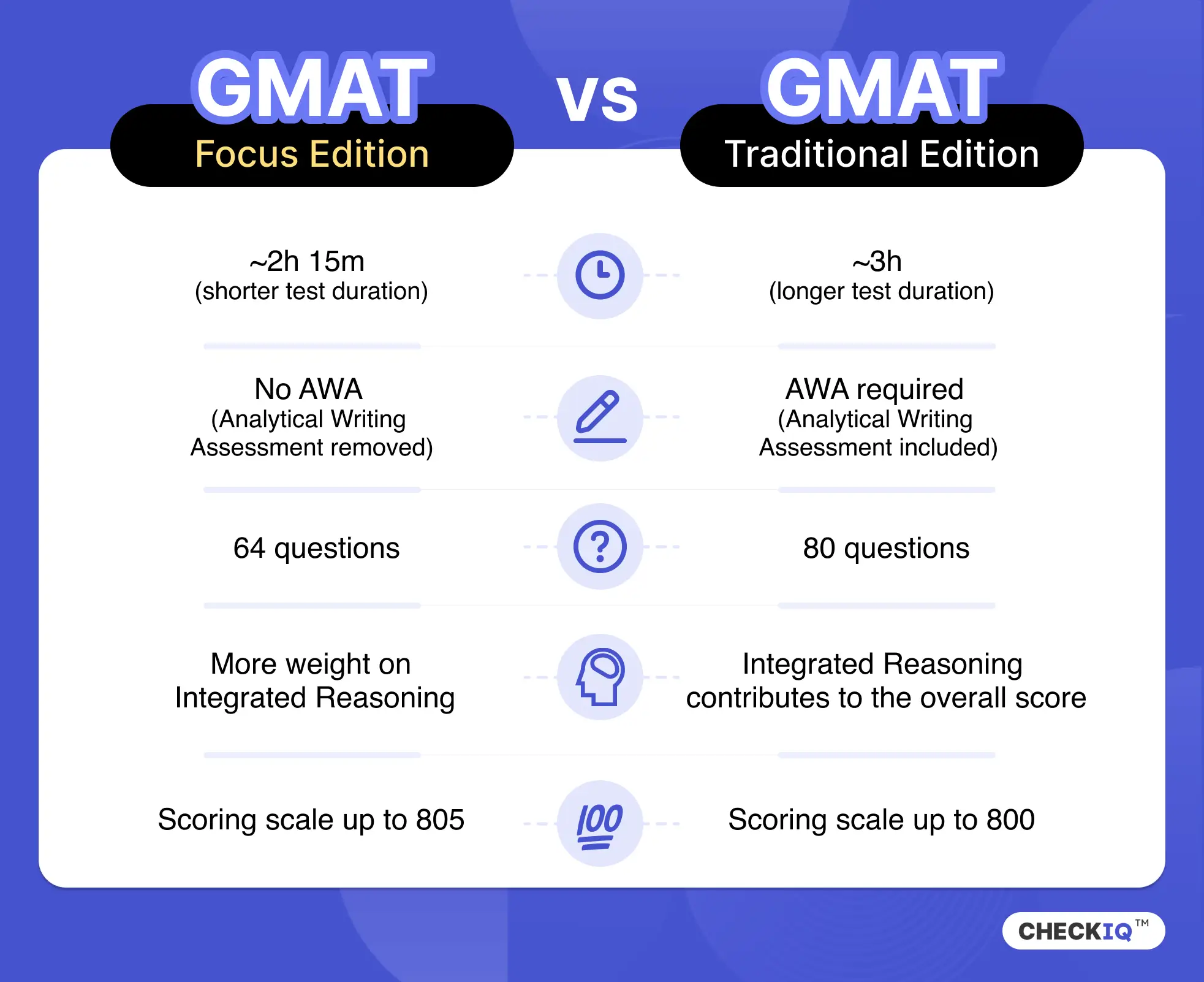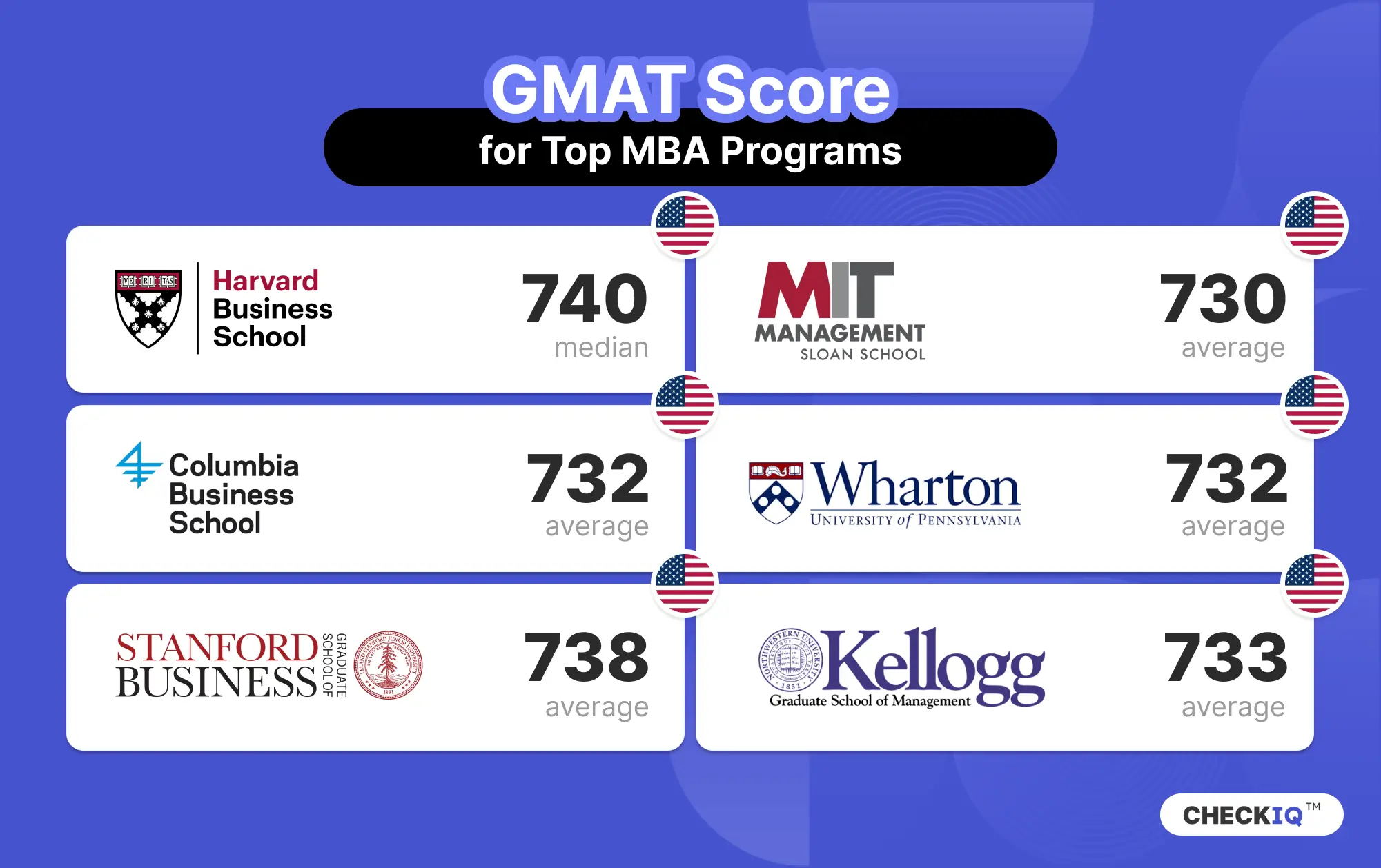
GMAT to IQ Calculator
If you’ve ever wondered how GMAT scores relate to intelligence and IQ, or more generally speaking, how these scores predict success in business school and in life, you’re in the right place.
The GMAT is often seen as a benchmark for academic ability, but it also tests critical thinking, problem-solving, and analytical skills.
Understanding how your score might reflect these traits can help you set realistic goals and prepare more effectively for both your business school journey and beyond.
What Is the GMAT?
The Graduate Management Admission Test (GMAT) is a standardized test designed to assess the skills and abilities of individuals applying to business schools worldwide. It has become one of the most widely used admissions tools for MBA programs, with over 1,700 schools recognizing it as an essential part of the application process.
The GMAT was first introduced in 1954 by the Graduate Management Admission Council (GMAC), then known as the Admission Test for Graduate Study in Business. The goal was to create a standardized way for business schools to evaluate applicants’ readiness for the strict demands of graduate-level business education. Over time, the test has developed to include multiple sections that assess verbal, quantitative, and analytical skills.
In 2023, GMAC introduced the GMAT Focus Edition, which reflects modern test-taking trends and aims to provide a more streamlined and relevant assessment experience for candidates. However, despite these updates, the main purpose of the GMAT has remained the same: to evaluate the cognitive and academic skills essential for business school success.
What Does the GMAT Measure?
The GMAT is specifically designed to evaluate skills that are essential for success in graduate business programs. These skills include:
- Quantitative reasoning: The ability to interpret data and solve mathematical problems, often within a business context.
- Verbal reasoning: Skills in understanding and analyzing written material, as well as evaluating arguments.
- Integrated reasoning: The ability to synthesize data from multiple sources, such as tables, graphs, and text, to solve complex problems.
- Analytical writing: The capability to articulate and critique an argument in a clear and structured manner.
- Critical thinking: The ability to assess situations, identify key issues, and make well-reasoned decisions based on available information, which is vital for business leaders.
- Time management: The GMAT tests how well candidates manage time under pressure, a crucial skill for handling the fast-paced nature of business school and the business world.
Unlike general intelligence tests, the GMAT is designed to assess skills that are directly useful in academic and professional environments, such as problem-solving, critical thinking, and data analysis. However, it’s important to understand that the GMAT doesn’t evaluate traits like creativity, leadership, or personality. These qualities are just as essential for success in the business world.
A reliable 100% adaptive online IQ Test. Get your IQ score immediately.
Start My IQ Test
GMAT Focus Edition vs. Traditional GMAT
The GMAT Focus Edition is a shorter and more streamlined version of the traditional GMAT. It reduces testing time to 2 hours and 15 minutes compared to the traditional GMAT's 3 hours and 7 minutes.
Key changes include the removal of the Analytical Writing section and the Sentence Correction questions, while the Focus Edition introduces a new Data Insights section to assess candidates’ ability to interpret and analyze data and use it in everyday business situations.

The scoring scales differ as well: the Focus Edition uses a 205-805 scale, while the traditional GMAT uses a 200-800 scale. Although a score of 645 on the Focus Edition roughly correlates to a 690 on the traditional GMAT, the scores are not directly comparable due to differences in scoring methods and content. Additionally, the Focus Edition offers greater flexibility: it allows test-takers to review and edit answers within each section before moving on.
However, since some schools may still prefer the traditional GMAT during the transition period, it’s crucial to check your target school’s requirements.
Instead of focusing on the total score alone, try to always pay attention to your GMAT percentile ranking. This is the best way to understand where you stand compared to other applicants, no matter which version of the test you take!
How Is the GMAT Scored?
As we mentioned, your GMAT score ranges from 205 to 805 for the Focus Edition, and 200 to 800 for the 10th Edition, and is calculated based on your performance in three sections: Verbal, Quantitative, and Data Insights.
Each section score is based on:
- Questions you get right
- Difficulty level of those questions
- Total number of questions answered
Your score report also includes percentiles, showing how you rank compared to other test-takers. It's worth noting that the GMAT uses a computer-adaptive testing (CAT) format, where the difficulty of the questions adjusts based on your previous answers, providing a more personalized measure of your abilities.
This means that the number of correct answers isn't the sole factor, but how you perform across a range of difficulty levels in each section.
This is similar to CheckIQ’s IQ test, which is adaptive.
Does IQ Correlate with GMAT Scores?
The relationship between GMAT scores and IQ often sparks curiosity, especially among test-takers looking to understand how their cognitive skills measure up. While GMAT scores and IQ both assess reasoning and problem-solving abilities, they are not the same. The GMAT is designed to predict academic performance in business school. On the other hand, IQ tests aim to measure innate intellectual ability.
Let’s go and explore the connection and key differences.
The correlation between GMAT and IQ
Research indicates a moderate correlation between GMAT scores and IQ, with national-level data showing a correlation of 𝑟 = 0.68 between GMAT scores and National IQ (Pesta et al., 2019). Both tests evaluate cognitive abilities like analytical reasoning and problem-solving, especially in the quantitative and verbal sections of the GMAT. This overlap has led some to infer IQ scores from GMAT scores, and even some high IQ societies accept GMAT results as a proxy for intelligence at the high-performance tail of the distribution.
However, it’s important to emphasize that correlation does not equal causation. Just because GMAT and IQ scores show some overlap doesn’t mean one directly determines the other.
Is the GMAT an IQ Test?
The GMAT is not an IQ test. Unlike IQ, which is believed to remain relatively stable throughout a person’s life, with a very small margin of potential for improvement, GMAT scores can be improved significantly with preparation. In fact, as pointed out by Talha Omer in his analysis of GMAT versus IQ, the GMAT rewards practice, discipline, and familiarity with its structure. These qualities don’t affect IQ scores.
Finally, it’s important to emphasize that correlation does not equal causation. Just because GMAT and IQ scores show some overlap doesn’t mean one directly determines the other.
Both GMAT and IQ scores follow a standard distribution, making it possible to compare percentiles. However, this similarity is more about statistical – and practical – trends than a functional relationship.
Summary of the key differences between GMAT and IQ
As we saw earlier, GMAT and IQ serve different purposes. And to close this section, here’s a summary of the main differences between the GMAT and IQ tests:
- Purpose: IQ tests are designed to measure general intellectual potential across various domains, while the GMAT focuses on business-related skills and academic readiness.
- Preparation: Although practicing IQ test questions can help improve your performance, IQ tests are generally designed to require no preparation and aim to assess raw cognitive ability. In contrast, GMAT scores can improve significantly with focused study, quality resources, and effective strategies.
- Flexibility: While a person’s IQ may change a bit overtime, it remains relatively stable, but GMAT scores are dynamic and can change depending on the amount and quality of preparation.
- Context of Use: IQ scores are typically used in academic or psychological contexts to assess intellectual potential, whereas GMAT scores are primarily used by business schools to evaluate applicants' readiness for graduate-level study in business-related fields.
This distinction is critical. As the GMAT questions measure skills that can be learned and refined, a high GMAT score reflects not only intelligence but also dedication and the ability to manage time effectively under pressure. For example, the GMAT’s tight time constraints and multi-layered questions challenge a candidate’s ability to think quickly and critically. These are skills that hugely differ from those assessed in IQ tests.
Does the GMAT correlate better with IQ than other standardized tests?
The GMAT, GRE, LSAT, and SAT all exhibit moderate to high correlations with IQ, primarily because they measure reasoning, problem-solving, and analytical skills, which overlap with cognitive ability. And it’s no surprise that these tests correlate well. For example, the GMAT and GRE are highly correlated with each other, with a correlation of r = 0.92. This does not directly relate to IQ but shows that the two tests measure very similar skills. Since both tests overlap significantly, it implies that their respective correlations with IQ may also be comparable.
The LSAT’s logical reasoning section is often highlighted as one of the best measures of raw intelligence, given its emphasis on critical thinking and reasoning over memorized knowledge.
But studies have shown that among the GRE, the ACT and the SAT, the SAT is the one that correlates the most with IQ (0.82), followed by the ACT (0.77) and the GRE (0.72). And since the GMAT and the GRE are highly correlated, we can assume that the SAT correlates better with IQ than the GMAT.
That said, no standardized test perfectly matches the design or comprehensiveness of a dedicated IQ test, which typically evaluates a broader range of abilities and minimizes the impact of study preparation.
How to Convert GMAT Scores to IQ
Converting GMAT scores to an IQ estimate is possible, but it comes with important considerations. Both the GMAT and IQ tests follow a standard distribution, which means percentile rankings can sometimes be mapped between the two. For example, if your GMAT score places you in the 95th percentile, you could reference an IQ percentile chart to estimate an equivalent IQ score. This is called the percentile matching method.
Our GMAT-to-IQ converter tool uses this percentile matching as its foundation. In order to convert your GMAT to an IQ, all you need to do is to simply input your GMAT score, and we’ll calculate an estimated IQ based on your percentile rank.
However, this method should be approached with caution. The average IQ of people who take the GMAT is likely higher than that of the general population. This means the percentiles for GMAT scores don’t match perfectly with the percentiles used for IQ, so a direct conversion might not be entirely accurate.
One way to make this conversion more precise is to look at GMAT scores accepted by some high-IQ societies – see the next section below for examples. These organizations set score thresholds that represent specific IQ levels.
Again, it’s important to remember that the GMAT and IQ tests are fundamentally different: the GMAT evaluates business-specific skills that can improve with preparation, while IQ tests aim to measure innate cognitive ability, which is less affected by practice.
GMAT Percentiles and IQ Conversion Table
Now that we’ve covered what the percentile matching method is about, hHere is a GMAT to IQ conversion table matching GMAT percentiles with IQ percentiles. We’ve reported the percentiles for both the Focus and GMAT Old scores, along with the corresponding IQ estimates based on a standard deviation of 15.
|
GMAT |
GMAT Focus edition |
Percentile |
IQ (Est.) |
|
770-800 |
805 |
100% |
135 |
|
750-760 |
715 |
99% |
135 |
|
740 |
695 |
98% |
131 |
|
730 |
695 |
97% |
128 |
|
720 |
675 |
95% |
125 |
|
710 |
665 |
93% |
122 |
|
700 |
655 |
90% |
119 |
|
690 |
645 |
87% |
117 |
|
680 |
635 |
83% |
114 |
|
670 |
615 |
80% |
113 |
|
660 |
615 |
78% |
112 |
|
650 |
615 |
75% |
110 |
|
640 |
595 |
71% |
108 |
|
630 |
585 |
65% |
106 |
|
620 |
585 |
63% |
105 |
|
610 |
575 |
59% |
103 |
|
600 |
565 |
55% |
102 |
|
590 |
555 |
51% |
100 |
|
580 |
555 |
48% |
99 |
Can Your GMAT Score Get You Into a High IQ Society like Mensa?
Your GMAT score can qualify you for some high IQ societies, but fewer groups accept the GMAT compared to other tests like the SAT or ACT. Societies that do accept the GMAT include the International High IQ Society (IHIQS), Intertel, and the International Society for Philosophical Enquiry (ISPE).
This way, each society has its own minimum GMAT score requirement, but they all expect you to be in the top percentage of test-takers:
- IHIQS: Requires a score of 710 or higher, which is in the 95th percentile.
- Intertel: Accepts scores in the 99th percentile, around 746 or higher.
- ISPE: Also requires a GMAT score of 746 or higher, as it focuses on the top 0.1% of test-takers.
Why don’t more societies accept the GMAT?
Since the GMAT is designed for business school admissions, and doesn’t aim to measure general intelligence, this is the main reason why fewer high IQ societies accept it. Tests like the SAT or ACT are more commonly recognized because they assess broader academic skills and are widely used for general purposes.
If you plan to join a high IQ society with your GMAT score, make sure to check their specific requirements. While it is possible, your GMAT score may give you fewer options compared to tests like the SAT.
Does the GMAT Predict Business School Success?
The GMAT is a reliable predictor of academic performance in the first year of business school, particularly in core courses. Research by Darin Kass et al, has found GMAT to be a good predictor of how well you’ll do in the first year of your MBA, particularly in core subjects like finance and analytics.
However, its predictive power has limitations. The GMAT doesn’t measure soft skills, such as leadership, teamwork, or emotional intelligence which are the qualities that play an important role in business success. Additionally, research by Chao Miao and colleagues highlights that success in business school depends not just on GMAT scores or intelligence but also on personality traits like diligence and hard work. These traits, collectively known as conscientiousness, can greatly influence academic outcomes, showing that both cognitive ability and effort matter.
Academic vs. career success
While the GMAT is effective at predicting academic performance, it doesn’t guarantee career success. As Yeaple’s research concluded, GMAT scores have little to no correlation with managerial effectiveness or post-MBA earnings. Long-term success is more influenced by factors such as the level of motivation, creativity, and interpersonal skills.
Frequently-Asked Questions
What’s a good GMAT score?
A "good" GMAT score depends on your target business schools. For competitive MBA programs, scores above 665 are often needed. However, some schools accept scores as low as 645, depending on other factors like your GPA and work experience.

For top 20 MBA programs, average scores tend to be much higher, often above 665. Here are some examples of typical GMAT scores for top MBA programs in the US in 2024:
- Harvard Business School: 740 (median)
- The Wharton School: 732 (average)
- Stanford GSB: 738 (average)
- MIT Sloan: 730 (average)
- Columbia Business School: 732 (average)
What is the average GMAT scores?
The average total GMAT score is 553, according to a GMAC study of GMAT test scores between 2019 and 2024.
- Verbal: 79.28
- Quantitative: 78.05
- Data Insights: 74.89
These averages give an overall picture of where most test-takers stand, but it’s important to remember that competitive business schools often expect higher scores, particularly in the Quantitative and Verbal sections, where candidates typically need to score well above average to be considered competitive.
What factors affect GMAT scores?
Many factors can impact a GMAT score, including test anxiety, lack of preparation, or unfamiliarity with the test format. For example, think about how a highly intelligent individual might perform poorly due to stress or inadequate time management during the exam. Interestingly, researchers from the University of Chicago have found that night owls tend to score higher on the GMAT compared to early risers, especially among students in top MBA programs. This is very interesting, and it could be related to differences in cognitive performance during certain times of the day.
Should you retake the GMAT?
Retaking the GMAT might be a good idea if your score is far below your target schools' averages or if you think you can significantly improve with more preparation. Keep in mind that schools often look at your highest score, so retaking is usually worth considering if you’re confident you can do better.
However, if your score is within a competitive range for your desired programs, retaking the test may not be necessary, especially if other aspects of your application, such as work experience or essays, are strong.
If your GMAT score isn’t as high as you’d hoped, don’t get discouraged, and remember that it’s just one piece of the puzzle. Business schools often take a holistic approach to admissions, considering not only test scores but also work experience, personal essays, recommendation letters, and leadership potential.
Does the GMAT predict business school success?
The GMAT is a reliable predictor of academic performance in the first year of business school, particularly in core courses.
Research by Darin Kass et al, has found GMAT to be a good predictor of how well you’ll do in the first year of your MBA, particularly in core subjects like finance and analytics.
However, its predictive power has limitations. The GMAT doesn’t measure soft skills, such as leadership, teamwork, or emotional intelligence which are the qualities that play an important role in business success.
Additionally, research by Chao Miao and colleagues highlights that success in business school depends not just on GMAT scores or intelligence but also on personality traits like diligence and hard work. These traits, collectively known as conscientiousness, can greatly influence academic outcomes, showing that both cognitive ability and effort matter.
Does the GMAT predict career success?
While the GMAT is effective at predicting academic performance, it doesn’t guarantee career success. As noted in a Forbes article by Ronald Yeaple, GMAT scores do not correlate with long-term managerial success or career outcomes. Some of the most accomplished business leaders scored modestly on the GMAT but excelled due to other qualities, such as creativity, resilience, emotional intelligence, and strong interpersonal skills.







